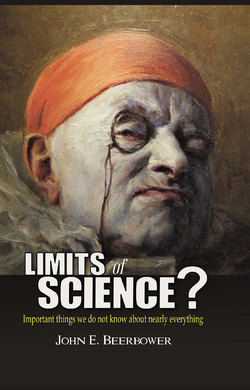Читать книгу Limits of Science? - John E. Beerbower - Страница 44
На сайте Литреса книга снята с продажи.
Usefulness Revisited
ОглавлениеAs we said above, mathematics reflects the formalization and extension of human logic or the process of rational thought. These extensions have become quite elaborate. Initially, mathematics reflected the analysis of “things” that people encounter is the physical world—“things” people experience through their senses. These “things” include numbers (as applied to quantities, counting and measurements) and shapes. Arithmetic and geometry became pretty sophisticated over time, revealing relationships and techniques that are not directly obvious.
However, mathematics evolved well beyond the practical or even the applicable.
Wigner, with some exaggeration, stated in his famous lecture that “Most advanced mathematical concepts, such as complex numbers, algebras, linear operations, Borel sets[,]…were so devised that they are apt subjects on which the mathematician can demonstrate his ingenuity and sense of formal beauty.” “The Unreasonable Effectiveness,” p.3. At least, we can say that mathematics is a human creation, that it has largely developed as an exercise in human reasoning and creativity and that it has often been pursued for the aesthetic and intellectual pleasures of the mathematician. See, e.g., Kline, Mathematics, pp.3–5; Barrow, Theories of Everything, pp.175–76; Wigner, “The Unreasonable Effectiveness,” p.7. As noted above, it is possible not only that mathematics is a creation of the mind, but of the human mind, with whatever lack of correspondence with or inability to see reality is inherent in the human mind.
These observations bring us back to the question of whether the human mind and its deductive theories can accurately reflect the structure of the physical world and, if so, why that is the case.20
As already suggested, science assumes that there are regularities in the physical world, since those regularities are what science attempts to understand. At the same time, it is clear that the world would not exist as it does, and we would not exist, if the natural world was not characterized by regularities—that the same things happen repeatedly, that certain phenomena regularly follow other phenomena, etc. As noted above, sometimes, such regularities are referred to as Laws of Nature. See Wigner, “The Unreasonable Effectiveness,” pp.4–6. Science has generally identified and expressed those Laws in the language of mathematics. Penrose explains that the use of mathematical models in science is necessary to obtain the precision required in the formulation of questions and “well-defined” answers, treating mathematics as a particularly precise or unambiguous form of communication. The Road to Reality, p.12.
